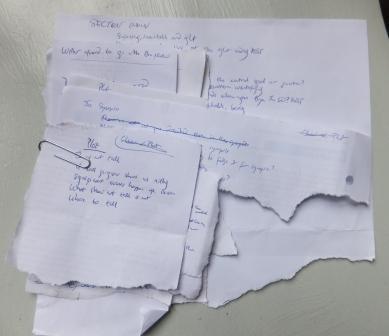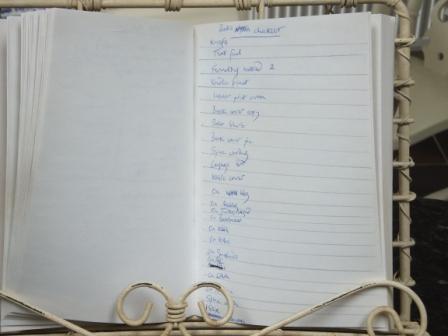Roz Morris's Blog, page 85
April 9, 2013
‘This is my blues novel’ – The Undercover Soundtrack, Nathan Singer
 My guest this week is another of those enviably talented writers who is as happy playing a set of strings as a qwerty keyboard. Not only that, he is a playwright and an experimental performing artiste. He says his various novels correspond to musical genres and he often composes a soundtrack before he starts writing. Beyond his own compositions, many of his favourite musicians help to set the tone and create the atmosphere, and some of them end up as cameos in the story. And what a story – the book he describes as his ‘blues novel’ features hellhounds in suits, a 1938s afterlife (possibly) and resurrected loves. He is Nathan Singer, and he’s on the Red Blog with the Undercover Soundtrack to Chasing The Wolf.
My guest this week is another of those enviably talented writers who is as happy playing a set of strings as a qwerty keyboard. Not only that, he is a playwright and an experimental performing artiste. He says his various novels correspond to musical genres and he often composes a soundtrack before he starts writing. Beyond his own compositions, many of his favourite musicians help to set the tone and create the atmosphere, and some of them end up as cameos in the story. And what a story – the book he describes as his ‘blues novel’ features hellhounds in suits, a 1938s afterlife (possibly) and resurrected loves. He is Nathan Singer, and he’s on the Red Blog with the Undercover Soundtrack to Chasing The Wolf.


April 7, 2013
Create your characters from different moulds
 I’m somewhat preoccupied with characters as I’m finishing NYN 2: Bring Characters To Life. I’ve recently read two novels with several main characters – one that made them real and the other that didn’t. I thought it would be interesting to compare the key differences.
I’m somewhat preoccupied with characters as I’m finishing NYN 2: Bring Characters To Life. I’ve recently read two novels with several main characters – one that made them real and the other that didn’t. I thought it would be interesting to compare the key differences.
The former is Ruth Rendell’s The Keys To The Street, which uses several points of view, all with their own internal identity. The shaky one is The Slap by Christos Tsiolkas. It follows eight separate people but they all sound exactly the same.
Briefly, The Keys To The Street is about a handful of characters in Regent’s Park, London, whose lives intersect over one summer. The Slap begins as an extended family gathers for a suburban barbeque. One of the children gets out of hand and one of the other parents gives it a slap. There is uproar and the novel explores the ripples.
In both, the narration is close third person, so although the ‘I’ pronoun isn’t used we’re following the thoughts and feelings of each individual.
Rendell is good at characters who sound distinct on the page. Their vocabulary, thought processes and speech rhythms make them into separate, recognisable people. Tsiolkas’s dialogue, both quoted and internal, sounds like it all comes from the same person.
Characters might sound similar because they come from the same culture and social milieu. But even so, there can be individual variation from the characters’ different natures. In the simplest terms, some would be introvert and some extravert. Some will see the glass as half-full. The emotions and urges behind their speech and thoughts would not be the same.
In The Slap they all have similar levels of aggression and introspection. In The Keys To The Street, there are several characters who are homeless or nearly homeless, but each has their own internal landscape. Some feel persecuted, some are tragically numbed.
Indeed, characters in the same milieu have many reasons not to be similar. They might have an assortment of occupations, which would make them tackle a variety of life problems and people.
In The Slap we potentially have these, but none of the differences are used. The TV scriptwriter sounds just like the civil servant and the businessman. In The Keys To The Street, the girl who works in the museum has different daily influences from the former butler who walks everyone’s dogs. These environments shine through their vocabulary and the comparisons they use. Their back stories are also vastly different, which affect how much each of them will trust other characters. Again, the girl in the museum believes good of people whereas the dog-walker suspects nasty motives in everyone.
Behaviour in extremis
Sequences of anger, sex and other kinds of extremis should tear the characters’ masks off. They should show us who they really are.
In The Slap, all the characters default to one pattern of behaviour when upset or emotional. They want to smash things or people. They brood on conversations and wish they had hit the offending person, pummelled their faces, grabbed them by the hair and shouted obscenities at them. When they curse, which they all do plenty of, they use the same words. Readers really notice when all the characters have the same curse personality. When they have sex, they all have the same preferences and urges.
In The Keys To The Street, the characters react according to their personalities, even when roused to the same emotion. When angry, the mentally unbalanced drug addict uses violence. The dog-walker resorts to blackmail or spits (or worse) in his employer’s tea. The museum curator’s former boyfriend is also violent, but immediately regretful. One emotion: three individual ways to handle it.
Other private moments
Other private moments can be very revealing. In The Slap, many of the characters are inclined to look at their reflection or a body part and think about their lives. In The Keys To The Street, the characters have their diverse ways of reflecting. Many of them don’t need to manufacture a specific thinking activity; they do something from their usual routine. This makes their reflective scenes different from each other. The dog walker collects his animals and does his job, meanwhile plotting and fulminating. The violent psychotic takes crack. The tragic down-and-out goes for his long walks, pushing the barrow that contains his possessions. What they do to get thinking time can be ways to differentiate their souls.
If you’re interested in either of these books, here’s Guardian Book Club on The Keys To The Street
And here’s a review of The Slap in The London Review of Books
Thanks for the pic r h
Have you read other novels that handle several point-of-view characters and differentiate them well? Or conversely, novels that do it badly? Let’s discuss!
GIVEAWAY On the Red Blog, Andrew James is giving away 2 signed copies of his novel Blow Your Kiss Hello. For a chance to win, he wants you to reply or tweet where the book title comes from. If you take the tweet option, include the link to the post and the hashtag #undersound. Find it on the Red Blog now
 If you liked this post, you might like NAIL YOUR NOVEL: Bring Characters To Life, coming in May. Find out as soon as it’s released by signing up for my newsletter. Latest edition of this random and infrequent publication can be found here
If you liked this post, you might like NAIL YOUR NOVEL: Bring Characters To Life, coming in May. Find out as soon as it’s released by signing up for my newsletter. Latest edition of this random and infrequent publication can be found here


April 3, 2013
‘Notions of past and present hold no sway here’ – The Undercover Soundtrack, Andrew James
 My guest this week describes his novel as having a subliminal soundtrack that wormed into his head and influenced the period, the tone, characters and the ties that connect them. The novel, Blow Your Kiss Hello, is a mystery and a thriller with a bit of Other too. It’s the story of a man searching beyond the boundaries of here and now in the hope of finding his missing girlfriend. It’s set mostly in the 1990s with threads of 1640, a crossing that becomes apparent as Faithless meets Henry Purcell’s opera Dido and Aenas. He is Andrew James and he’s on the Red Blog with his Undercover Soundtrack.
My guest this week describes his novel as having a subliminal soundtrack that wormed into his head and influenced the period, the tone, characters and the ties that connect them. The novel, Blow Your Kiss Hello, is a mystery and a thriller with a bit of Other too. It’s the story of a man searching beyond the boundaries of here and now in the hope of finding his missing girlfriend. It’s set mostly in the 1990s with threads of 1640, a crossing that becomes apparent as Faithless meets Henry Purcell’s opera Dido and Aenas. He is Andrew James and he’s on the Red Blog with his Undercover Soundtrack.


March 31, 2013
Ink or keyboard? When a computer-loving writer prefers a pen
 I adore, adore, adore my computer. I have acres of folders for each book I write, stuffed with research links, musings about characters, thoughts about the story’s overall direction. I have thematic notes, background, significant geography, historical events that might make a difference. I write my text on the computer, I have scribble files for experimenting, outtakes files and the text proper.
I adore, adore, adore my computer. I have acres of folders for each book I write, stuffed with research links, musings about characters, thoughts about the story’s overall direction. I have thematic notes, background, significant geography, historical events that might make a difference. I write my text on the computer, I have scribble files for experimenting, outtakes files and the text proper.
But there are some parts of my work that I have to do in ink.
I hadn’t thought about this until an email arrived from Robert Scanlon, who’s using Nail Your Novel with Scrivener and was wondering whether to put the beat sheet analysis into the note cards for each scene. The short answer is, yes if it works for you. Personally I wouldn’t write a beat sheet on the computer, but we all work in different ways.
So this will be a very idiosyncratic post, but I thought it might make a creative discussion. I’ll tell you mine, then you tell me yours, okay?
Going back to Robert’s question, I find the beat sheet’s distinctive methodology ( a sheet of A4, coloured pens and smiley faces) helps me to see it as a fresh phase and therefore to analyse the material for new ideas and narrative directions. So it’s paper beat sheets for me.
In a nutshell, the beat sheet is a way to analyse your entire novel for pacing, character arcs, structure, subplots and theme. It shrinks your novel to a few easily readable pages of A4. It’s singlehandedly saved me from literary chaos over and again.
I tried writing beat sheets on computer and they were a disaster. Something happens to my brain when I get keys under my fingers. It’s like letting a fresh horse step onto springy turf. I just go. Words gallop away and I end up with a long, musing essay about the book. Although this might do me good in some ways, it is useless for analysis.
So I have to write beat sheets on paper. The pen makes me aware of every mark. Some writers like spreadsheets because the format forces similar practical distance.
Index cards for synopses
When I’m outlining, I write the main events on index cards and shuffle them to get the best order. Although I’ve tried this on the computer, my brain thrives on complication and it always gets out of control. Index cards and a fat marker pen keep me focussed. (The cards game is also a tool from Nail Your Novel.)
I plan my Nail Your Novel books differently from my fiction. I write scribbled outlines on scraps of paper. The characters book is nearly finished and I’ve thrown its notes away, so this is the outline for NYN 3, which is in rough manuscript. Yes, those are bits of paper torn from the bin. I love the organic look of them, which reflects the feeling of a book evolving and becoming better. Don’t be fooled by the ramshackle appearance. They are highly organisational and will be much-consulted documents until the manuscript is ready for polishing.
To-do notebook
Each book generates vast amounts of admin. Research needs to be done, books must be added to reading lists. I find it easier to keep track of this in a notebook. Then I also have the pleasure of crossing items off and they stay there, a testimony to another job done. Way more satisfying than erasing them with ‘delete’.
My notebook also contains charts for each book’s production. This is a legacy of my years in books and magazines, where I had to invent systems to keep track of 30 books at different editorial stages. It covers everything from checking cross-references, finalising spine wording, buying artwork, the websites I’ll need to update when new books come out etc. Again, I prefer this on paper because I can see the books developing at a glance.
Ideas notebooks
Journals of scribbled ideas were the very first kind of notebook I kept. I still use them, but the ideas in them aren’t very findable. This irks me and I wish I could x-ray them to categorise all the useful stuff, but alas that would be a mammoth job. So I now dip into them as an inspiration slushpile. Most things I find are rubbish or irrelevant to my immediate needs, but I also uncover useful gems.
Why not Scrivener?
I clearly have the organisational mindset, and people often ask me why I don’t use Scrivener. Especially as Nail Your Novel fits it like a glove, I’m told. I’ve thought Scrivener might be fun, but I like to have some aspects of my books in touchable form, on scattered (but precisely organised) papers and notebooks. Also, I love inventing, period, and that includes systems for my books. Or put another way, I’m a nerd.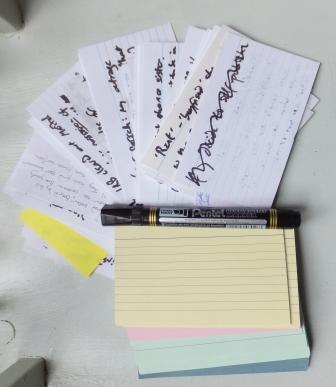
If there is a general pattern, I use handwritten notes to get clarity, distance, control and simplicity. The big picture stuff. I use the keyboard to indulge my creative riffing, musing, speculating and – of course – for the writing.
Now it’s your turn. When do you use the computer and when do you use ink and paper? Do you have set habits and how did you develop them?


March 27, 2013
‘The music gave me short sentences, like gunshots’ – The Undercover Soundtrack, Grigory Ryzhakov
 My guest this week tackles a range of narrative styles – comedy, action sci-fi and romcom. He uses music to tap into the right mood for a character or to find the right rhythm for the prose. He also composes and performs music under an alias, so when he hasn’t been able to find a suitable soundtrack for his writing, he creates his own. He is Grigory Ryzhakov and he’s on the Red Blog with his Undercover Soundtrack.
My guest this week tackles a range of narrative styles – comedy, action sci-fi and romcom. He uses music to tap into the right mood for a character or to find the right rhythm for the prose. He also composes and performs music under an alias, so when he hasn’t been able to find a suitable soundtrack for his writing, he creates his own. He is Grigory Ryzhakov and he’s on the Red Blog with his Undercover Soundtrack.
GIVEAWAY Grigory is giving away 5 copies (Kindle or epub) of his two-part novelette Becoming Agie to commenters. Leave a note on his post to enter – and if you tweet or share on Facebook, G+ or other media, be sure to mention because that counts as extra entries too.


March 24, 2013
Bringing the dead to life… Why novelists should read obituaries
 Many years ago, my writer friend Cathryn Atkinson told me she found inspiration for characters by reading obituaries, especially those in the Daily Telegraph. By gum she was right, and I was soon curating my own file of the fascinating dead. I called it my morgue, of course.
Many years ago, my writer friend Cathryn Atkinson told me she found inspiration for characters by reading obituaries, especially those in the Daily Telegraph. By gum she was right, and I was soon curating my own file of the fascinating dead. I called it my morgue, of course.
Reading obits is still a habit, and not just to discover queer folk. I’m inspired by the way obit writers tackle certain problems we also have in novels.
Physical descriptions
Although famous people obviously get obits, so do obscure achievers.
For the writer, it’s easy to describe a person who is already well known; you just tick their recognisable characteristics. For Elizabeth Taylor, reference the violet eyes, voluptuous proportions and bawdy persona – and that’s enough to summon their physical presence.
But the obit writer often has to describe a person the reader hasn’t seen before. Which is also what the novelist does.
Crucially, they don’t rely on visual descriptions. Blue eyes and a crooked front tooth don’t mean much if the reader doesn’t already have a mental picture. So the obituarist adds another dimension – the sense of what it’s like to be in a room with the subject. One of the earliest entrants to my morgue file was an eminent female chemist who always had a worried expression, as though she feared a catastrophe was happening in the next room. I’ve long forgotten her name or what she was responsible for (alas), but I still know what it would be like to spend time with her. Another unforgettable was the religious leader who had the disconcerting habit of closing his eyes while he spoke.
The obit’s subjects may not always be nice or heroic.
Take The Economist’s obituary of UK reality TV star Jade Goody. She was infamous for squalid incidents, astonishing ignorance and racist remarks. She was also a shameless publicity hound. The obit didn’t whitewash any of this, but their unsparing portrait also uncovered her battles, hardships, goals and happinesses. The result gives her remarkable dignity.
This is so interesting for novelists. Even if we’re writing nasty characters, they become more potent if we approach them with respect and curiosity.
Back story and context
Obits generally follow a formula. First they hook your interest – tell you why the character is significant, conjure up a conundrum that gets you curious. Then there will be defining incidents from their prime. Details about childhood don’t come until late in the piece. After we have read about the achievements or ignominies, we are shown how the person started with similar stuff to ourselves – parents, a local library or sports ground, school teachers. There they are, just like we were, unaware of their destiny.
It might be peculiar to follow that backwards chronology in most novels, of course, but it’s a reminder that back story works because of context. Deployed in the wrong place, back story will be boring. In the right place, it can be humanising and even powerful.
Are there any non-fictional places you go for inspiration, such as obituaries? Why do you like them? Share in the comments
GIVEAWAY Don’t forget you can win a signed print copy of one of Tabitha Suzuma’s award-winning novels if you comment on her Undercover Soundtrack on the Red Blog!
 And PS… if you enjoyed this post, you might like the next Nail Your Novel book, which is all about characters. It’s due for release in May, so if you’re interested to know more, sign up for my newsletter.
And PS… if you enjoyed this post, you might like the next Nail Your Novel book, which is all about characters. It’s due for release in May, so if you’re interested to know more, sign up for my newsletter.


March 22, 2013
A Very British Blog Tour – post at Authors Electric
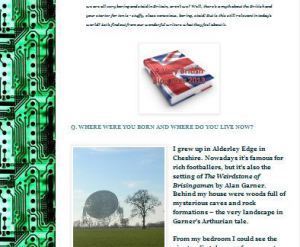 The files that make up this blog post are a twinkle in a data farm somewhere in the US. My books are too, blades of virtual grass in the electronic territories of KDP, Smashwords, Kobo and On-Demand Publishing. (If that’s already fried your brain, Daniel Marvello will no doubt save us with a comment that makes sense of it all, and straighten out my assumptions.)
The files that make up this blog post are a twinkle in a data farm somewhere in the US. My books are too, blades of virtual grass in the electronic territories of KDP, Smashwords, Kobo and On-Demand Publishing. (If that’s already fried your brain, Daniel Marvello will no doubt save us with a comment that makes sense of it all, and straighten out my assumptions.)
We publish everywhere our language can be read. I’m sure most of the commenters here aren’t from the UK. So I’m quite amused to be invited to A Very British Blog Tour, which aims to celebrate authors from our small isles and pin down whether our national characteristics influence our work. I never even thought about what those were; I simply wrote. Anyway, do drop in for a cup of Earl Grey.(You don’t have to drink it.)
And out of curiosity, tell me: where are you reading this blog?


March 19, 2013
‘A harsh, frightening and lonely book to write’ – The Undercover Soundtrack, Tabitha Suzuma
 The most haunting pieces on The Undercover Soundtrack delve far deeper than inspiration. My guest this week shares a very personal story. Her debut novel, about a teenage piano prodigy, didn’t come from a captured track in headphones. It was her own brother learning Rachmaninoff piano concertos in the room above hers. The character struggles with bipolar disorder, as she has in her own life. A later novel tackles an incestuous and doomed love between brother and sister, a harsh and frightening story that she says took a severe toll on her own mental health. Her fiction has won multiple awards and her brother is finishing his studies at the Royal Academy of Music. She is Tabitha Suzuma and she’s on the Red Blog with her Undercover Soundtrack.
The most haunting pieces on The Undercover Soundtrack delve far deeper than inspiration. My guest this week shares a very personal story. Her debut novel, about a teenage piano prodigy, didn’t come from a captured track in headphones. It was her own brother learning Rachmaninoff piano concertos in the room above hers. The character struggles with bipolar disorder, as she has in her own life. A later novel tackles an incestuous and doomed love between brother and sister, a harsh and frightening story that she says took a severe toll on her own mental health. Her fiction has won multiple awards and her brother is finishing his studies at the Royal Academy of Music. She is Tabitha Suzuma and she’s on the Red Blog with her Undercover Soundtrack.
GIVEAWAY: Tabitha has signed print editions on offer for the three most interesting comments. If you enjoy her post, let her know!


March 17, 2013
Story structure: why plot milestones might not be equally spaced – and why that’s good
 I’ve had a question from Jennifer Ibarra.
I’ve had a question from Jennifer Ibarra.
How exact do story milestones have to be? I did a lot of planning and put them in the ‘right’ points in the story (25% for the first turning point, half way for the midpoint, 75% for the second turning point). But they’re off by 1-2k words. Will the story feel unbalanced? Or should I keep trimming and adding?
The short answer: Stop! There is much to discuss…
What are we talking about?
Let’s backtrack. Stories have natural turning points, where the plot increases the pressure on the characters. When you build a story from beats (episodes where something changes) you’ll find they often fall into a pattern (usually used in movies).
Act 1, the first quarter, is the set-up with the event that begins all the trouble – the inciting incident. Act 2 is the second two quarters, where the problem is being actively tackled and confronted. Act 3, the last quarter, is the resolution. In each of these phases, the stakes change, and the protagonists’ goals and feelings change.
Why do they divide like this? The audience seems to have an internal clock, and feels the story needs these emotional shifts. They also find it most satisfying when played out in these phases. (BTW, some people call it the three-act structure, some decide there must be four acts because act 2 has two parts. Both terms mean the same thing. Another name for these shifts is plot points. Clear?)
How exact do these act points have to be?
If you’re writing for TV they matter to the minute. Movies could be more fluid, but commercial studio executives are so used to formulae and paradigms that they only commission stories that fit it. And they go to expensive conferences that reinforce this so it becomes holy writ.
But novels…
Although stories fit a natural structure, the divisions aren’t exact, as Jen is discovering. Here’s another part of her letter to me:
Once we start writing the scenes out, they take on a life of their own, and no matter how careful we are in planning, things will shift around
They do indeed. And that’s good.
Stories are organic. You can’t rush certain sections to get them to a plot point or you might race ahead of the reader. Curiously, when that happens, they might tell you you’re going too slowly. In fact, you might need to slow even more, make sure the reader understands why the scene’s events are important.
Remember, these plot points are emotional crescendos. They are times of greatest tension, pressure and surprise. And they work because of how you’ve primed the reader.
Equal but not equal
Here’s an example in action. My Memories of a Future Life is 102k words. When I released it in episodes, I aimed for roughly 25k words each. I actually got 26k, 31k, 19k and 28k.
I have to admit, I’d forgotten the proportions varied that much (although they obviously worked as readers said they were gripped). I realise this tells us something about the different flavours of each act. (So thanks, Jen, for making me consider it.)
Act 1 contains set-up, whic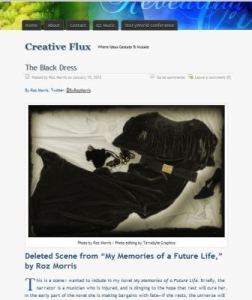 h has to be balanced with momentum. That’s tricky and it’s why beginnings are often too slow. The reader needs enough back story to understand what matters, but must also feel they’re seeing characters reaching a point of no return. (I wrote a while ago about a scene that I cut from Act 1 because of the pace – Carol’s performance dress. Not because of wordcount, but because it repeated an emotional point. If I’d left it in, the reader would have felt the story was circling over the same ground.)
h has to be balanced with momentum. That’s tricky and it’s why beginnings are often too slow. The reader needs enough back story to understand what matters, but must also feel they’re seeing characters reaching a point of no return. (I wrote a while ago about a scene that I cut from Act 1 because of the pace – Carol’s performance dress. Not because of wordcount, but because it repeated an emotional point. If I’d left it in, the reader would have felt the story was circling over the same ground.)
In Act 2 we’ve settled down. We’re involved with the characters enough to be curious about their back story and lives. (I could have added the black dress scene here, but the moment for it was gone.) At the same time, the complications are thickening.
In Act 3, we’ve turned a corner. Situations get worse, problems are more desperate. There won’t be much new material because this is a phase of consequences. Bad choices come back to bite. Fuses burn up. We’re building to a crisis.
Act 4 is the climax, and the reader will be turning pages fast. But it has a lot to pack in. The denouement will be intense and pressured. There will be reversals where it doesn’t go as planned, and moments when all seems lost. There will be revelations. Each of these story beats will need immense space, as if time has slowed down, to do justice to their impact and to allow the characters to react and adjust. There will be many ends to tie. After the final action, you don’t just tip the reader into the street, blinking. You need a leave-taking, to send the characters on into new lives. The reader knows they’ll be leaving them behind, so will savour the chance for a few less-pressured, appreciative moments before parting for good.
Here we can see there are good, organic reasons why each act may not hit the same wordcount, even though it will feel near enough to the reader.
Novels aren’t movies
Although there’s a lot that novel-writers can learn from movie storytelling, the media are not the same. The popular prophets of the three (or four)-act structure – Robert McKee, Syd Field and Blake Snyder – are script doctors. They’re not talking about novels and they probably don’t read them. Indeed movies and TV have to fudge the plot points with fillers – extra miles in a chase, a scene where the character polishes his revolver and stares into a glass of whisky. There’s usually music or a montage to divert the audience’s attention from a scene that’s spinning its wheels. In novels you can’t use fillers; they don’t work. And what’s more, you don’t have to.
So Jen, you’ve already done enough. You’re writing in a medium that allows you different act lengths. Enjoy it!
Thanks for the golden ratio pic Snotty on Wikimedia Commons
What would you say to Jen?
Little bit of news
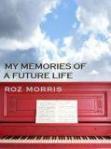 My Memories of a Future Life is now on Kobo and Smashwords. I’d put it off because it would look unconvincing without reviews and also because I expected formatting migraines. But it was easy, and I’m an idiot for not doing it sooner like any other go-getting indie. Also, you can now port Goodreads reviews to Kobo – here’s a post by Eric Edstrom explaining how. Even so, I only braved it because of a request from The Alliance of Independent Authors, who are teaming up with Kobo for the London Book Fair and wanted to put my books on a shortlist to be featured. My work is a tiny proportion of the books they’re submitting, so the chance of making the cut is small, but it’s terrific to be asked! Do you put off uploading your books on all platforms? Tell me why (or tell me off) in the comments!
My Memories of a Future Life is now on Kobo and Smashwords. I’d put it off because it would look unconvincing without reviews and also because I expected formatting migraines. But it was easy, and I’m an idiot for not doing it sooner like any other go-getting indie. Also, you can now port Goodreads reviews to Kobo – here’s a post by Eric Edstrom explaining how. Even so, I only braved it because of a request from The Alliance of Independent Authors, who are teaming up with Kobo for the London Book Fair and wanted to put my books on a shortlist to be featured. My work is a tiny proportion of the books they’re submitting, so the chance of making the cut is small, but it’s terrific to be asked! Do you put off uploading your books on all platforms? Tell me why (or tell me off) in the comments!
Also, I’m well into edits on Nail Your Novel: Bring Characters To Life. It’s due for release in May, so if you’re interested to know more, sign up for my newsletter.
And third: GIVEAWAY! Over on the Red Blog Dave Malone is giving away copies of his new poetic noir crime novelet Not Forgiven, Not Forgotten. Leave a comment and you might grab one!


March 12, 2013
‘Music dark and soulful; rural and tough’ – Dave Malone, The Undercover Soundtrack
 My guest this week is best known for his poetry collections, but has had a weakness for crime fiction ever since he was a 10-year-old, smuggling a radio to bed to catch Mystery Theater. Music – and a few fingers of bourbon – were his close companions when writing his first novelet Not Forgiven, Not Forgotten. The Hank Dogs made the main character a dark angel in a corrupt town. Billie Holiday stopped the romance getting too sweet. He is Dave Malone and he’s on the Red Blog with his Undercover Soundtrack.
My guest this week is best known for his poetry collections, but has had a weakness for crime fiction ever since he was a 10-year-old, smuggling a radio to bed to catch Mystery Theater. Music – and a few fingers of bourbon – were his close companions when writing his first novelet Not Forgiven, Not Forgotten. The Hank Dogs made the main character a dark angel in a corrupt town. Billie Holiday stopped the romance getting too sweet. He is Dave Malone and he’s on the Red Blog with his Undercover Soundtrack.





